 |
Berlin in Early Berlin-Wall Era CIA, State Department, and Army Booklets
The historical background behind The Day Before the Berlin Wall: Could We Have Stopped It?
This book is a by-product of the research for a novel about the crisis that became the epicenter of the secret Cold War. The Day Before the Berlin Wall: Could We Have Stopped It? is the story of one of the American soldiers who worked hard to collect intelligence about East German and Soviet intentions on the eve of the construction of the Berlin Wall in August 1961. It asks the question of why this intelligence was not used, and speculates about what could have happened, if it had been used. That is what makes the novel An Alternate History of Cold War Espionage.
The booklets reproduced in this volume define the historical context of The Day Before the Berlin Wall. They cover the period from 1958 to 1966, spanning the critical year in which the Wall was built: 1961.
The decision to reproduce these booklets was based on a number of considerations. The CIA Berlin Handbook is not available in print. The copy of the State Department booklet on Berlin at the National Archive is incomplete. The missing pages have been filled in from my own personal archive. The booklets from Berlin Brigade are not to be found on WorldCat, the on-line catalogue of a consortium of libraries, headed by the Library of Congress. Nor are they to be found at the National Archive. Reprinting will make them all available for research libraries to add to their collections.
The second consideration is that—when presented in a single volume— these booklets have a historical value that is greater than the sum of the individual booklets in isolation. The booklets all represent three different perspectives of Berlin: practical, rhetorical, and pragmatic.
The CIA Berlin Handbook is practical. It presents factual data on Berlin, ranging from statistics on the number of East German refugees to the military order of battle for the Group of Soviet Forces, Germany. It lists which railroad bridges on the lines to Berlin are “chambered for demolition,” and presents the statistics on how many refugees have left East Germany since 1949.
The State Department Background Berlin is rhetorical. It presents the legal status of the Four-Power occupation of Berlin in a way that a lawyer would love, replete with original documents of the time, and quotes from Presidents and Secretaries of State. It considers the consequences of “closing the escape hatch” from East Germany, and ponders the effects of West Berlin as a “lighthouse of freedom in a dark totalitarian sea. … [that] demonstrates the material superiorities of a free society which allows and encourages individual initiative.”
Berlin Brigade Special Services Presents Berlin is pragmatic. It presents a guide of how to get on with life in Walled Berlin, ranging from the history of Berlin to where to go shopping and sightseeing. This is the point of view of the Americans who actually lived in Berlin, sharing the fate of those whom it was their impossible duty to defend, because—as the Berlin Handbook says—“the Soviets and East Germans could seize West Berlin at any time.”
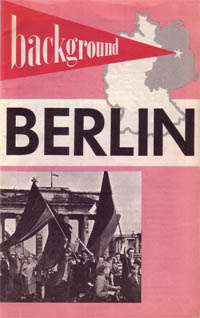
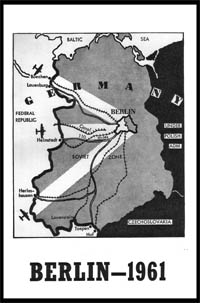
Making it easy to compare these perspectives in a single volume is one of the “values added” by this reprint of these booklets. Another is that the State Department and Berlin Brigade booklets create a sense of living history. The differences between pre-Wall and post-Wall editions are presented in-line so that the reader can see how things changed in Berlin between those two points in time.
It is things like this that make it appealing for those interested in the history of Berlin to read these early Berlin-Wall Era booklets in parallel. There is an index to make this easier. No attempt has been made to re-edit the texts. Only blatant typographical errors have been corrected.
Published for the 25th Anniversary of the Fall of the Berlin Wall
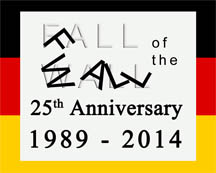
- Chronology of the Wall v
- Quotes: vi
- Dedication ix
- Compiler’s Foreword xii
- The Day Before the Berlin Wall: Could We Have Stopped It? xiv
- The Legend? — Or was it fact? xv
- Why Nothing Happened xviii
- What Could Have Happened? xxii
- The Day Before the Berlin Wall: Could We Have Stopped It? xiv
- Berlin Handbook: the CIA Guide to Berlin 1
- Background Berlin: The State Department Guide to the Berlin Crisis 99
- Berlin Brigade Special Services Presents Berlin 197
- Appendices 271
- Declassified German Cable: SUBJECT: Closing of the Sector Border, 11 August 1961 15:35 hours
- Report on a Session of the Federal Chancellor’s Cabinet on 17 August 1961
- CIA Memorandum: SUBJECT: The East German Refugees, 10 August 1961
- Extract: Congressional Record — Senate, August 1, 1961
- Department of State Airgram: From: Bonn – To: SECSTATE Washington, August 3, 1961
- Minutes of Meeting of Inter-Departmental Steering Group on Berlin, July 26, 1961, 5:15 p.m, The White House
- (
SECRET) Berlin: A Political Program, July 31, 1961 - Translation of the text that was expunged from the 1981 edition of Jürgen Petschull, Die Mauer: August 1961 — 12 Tage zwischen Krieg und Frieden (page 205)
- Index 281
- Generations of the Wall 298
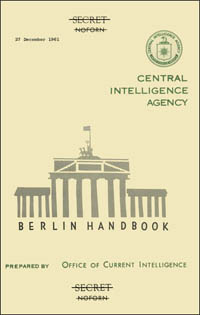 Berlin Handbook
Berlin Handbook
Table of Contents
I. Allied and Bloc Positions 9
Soviet 9
British 10
French 11
West German 12
East German 14
II. Legal Basis for the Western Presence in Berlin 17
III. The Berlin Wall 19
IV. West Berlin 21
Impact of the Wall 21
Legal Ties with Bonn 22
Allied Responsibilities 22
Berlin Role in Bonn Government 23
Federal Agencies in Berlin 24
Industry 24
Stockpiles 25
Dependence on West Germany 27
Trade 27
West Berlin-West Germany Transportation 28
West Berlin SED 30
City Transportation 30
Steinstuecken 31
V. The Borders 33
Sector-crossing points 33
Zonal 34
Bypasses 35
VI. East Berlin Economy 37
VII. Interzonal Trade 39
VIII. Access to Berlin 41
Air 41
Road 42
Railroad 43
Waterways 46
IX. Soviet and Allied Military Forces 47
West Berlin Police 47
Allied Forces in West Germany 47
Communist Forces in East Germany 49
Annexes 53
A. Select Chronology 53
B. Major Documents Establishing Berlin’s Legal Status 65
C. Extracts of Articles of West German Constitution 67
D. West German Agencies in Berlin 69
E. The United States Mission in Berlin 71
F. Documents Required by the East German Regime for Entering East Berlin, transiting the GDR or Entering the GDR 73
G. Currency Controls 77
Tables
I. Indices of West Berlin Industry 25
II. West Berlin Stockpiles 26
III. Freight Traffic 28
IV. Western Strength in Berlin 47
V. Allied Forces in West Germany 49
VI. Communist Strength in East Berlin and East Germany 52
List of Graphics
Maps
Soviet and East German Ground Forces 79
East Germany: Missile Sites 80
East Germany: Permanent Restricted Areas 81
Berlin Authorized Border Crossing Points 82
Berlin Zonal Border Crossing Points 83
Communication Routes between West Germany and Berlin 84
Berlin Wall 85
Charts
Refugee Flights from East Germany and East Berlin 86
Economy of West Berlin 93
Photographs
Friedrichstrasse 94
Babelsberg (2 photos) 95
 Background Berlin
Background Berlin
Contents
Three Presidents of the United States on Berlin 103
Foreword 106
A Few Basic Facts 106
The Allied Trusteeship 107
Agreement to Reestablish Germany as One Nation 109
The Right of Access to Berlin 111
Early Communist Maneuvers 113
The Communist Election Failure 114
Imposition of Communist Control on East Germany 114
Economic Merger of the Western Zones 116
Soviet Imperialist Aims vs. West European Rehabilitation 118
The Blockade and the Airlift 119
The Heroic Stand of the West Berliners 121
Berlin After the Blockade 125
The Political Reconstruction of West Germany 127
The Soviets Set Up an East German Puppet Regime 127
“People Who Vote With Their Feet” 129
The Federal Republic Comes of Age 131
Free Berlin and Free Germany 133
The Quest for a German Peace Settlement 134
The Second Major Assault on Free Berlin 135
The Western Peace Plan 137
The Soviet Plan 137
The Plan for a “Demilitarized Free City” 138
Khrushchev’s War Threat 140
Impasse and Another Approach to the Summit 141
The Third Assault 142
The Closing of the Escape Hatch 142
The Allied Trusteeship—What the Record Shows 144
What the Free Berliners Want 145
The Free World’s Stake in Berlin 146
Annexes
I. Soviet Aide Memoire of June 4, 1961 151
II. U.S. Note of July 17, 1961 156
III. Three Power Agreement of 1944 164
IV. Statement by President Kennedy, July 19, 1961 167
V. The Berlin Crisis—Report to the Nation by President Kennedy, July 25, 1961 170
VI. Excerpts From Statements by Walter Ulbricht 180
VII. Statement by Secretary of State Dean Rusk, August 13, 1961 181
VIII. Text of Protest Letter From the Three Western Commandants to the Soviet Commandant, August 15, 1961 182
IX. U.S. Note of August 17, 1961, to Soviet Government, Protesting Closure of Soviet Sector Border in Berlin 183
X. Soviet Violations of International Treaties and Agreements Relating to Germany prior to August 1961 185
XI. Selected Bibliography 193
Statements by Secretaries of State 196
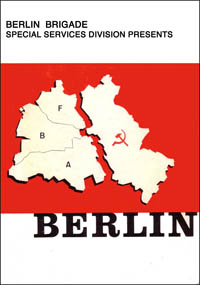 Berlin Brigade Special Services Presents Berlin
Berlin Brigade Special Services Presents Berlin
Table of Contents
Foreword 202
Brief History of Berlin 204
East Tour 206
West Tour 235
Entertainment Guide 254
Theaters 255
Museums 256
Sports 259
Restaurants 261
Night clubs 263
Shopping Guide of Berlin 264
Antiques 265
Cameras 266
Jewelry & Watches 266
Leather Goods 267
Porcelain 267
Specialty Shops 268
International Hotels in Berlin 269
Prices for the individual booklets on eBay range from $10 - $25, depending on the condition. At $14.95, the reprint is considerably less expensive. Buy one now.
Also in the Berlin in … Booklets series:
- Berlin in Early Cold-War Army Booklets. This is a reprint of a series of six army booklets on Berlin, covering the period from 1946 to 1958. The booklets are written from a single institutional viewpoint, that of the United States Military Command in Berlin. When read in parallel, the booklets create a sense of living history, because, while they cover the same topics of interest about Berlin, their coverage of these topics changes as the series progresses, and you can see the political relationships of the time change before your eyes.
- Berlin in Détente-era Berlin Brigade Booklets and the Story of Berlin Brigade They cover the period from 1967 to 1975, spanning the tenth anniversary of the Berlin Wall (1971), and the beginnings of the short-lived Détente in relations with the Soviet Union.
While you are here, check out these other interesting links:
The OFFICE OF THE U. S. HIGH COMMISSIONER FOR GERMANY, BERLIN published a booklet entitled A Survey of Berlin on JULY 1, 1950.
The feature article in the May 1959 issue of Army Digest was on Berlin. Follow me to read it.
The November 1961 issue of Army Digest carried a photo montage of the U.S. Army responding to the Communist challenge on the front lines of freedom in Berlin.
The August 1969 issue of Army Digest ran an article on the Berlin Duty train.
Also by this author: three award-winning Berlin novels:
Voices Under Berlin: The Tale of a Monterey Mary
